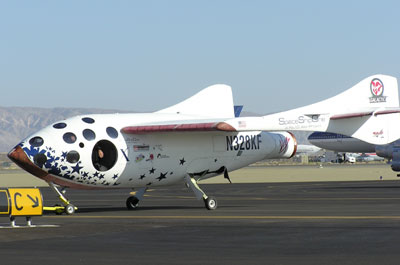The safety lode starby Sam Dinkin
|
| Space supremacy will be taken for granted until it is lost. |
Of course, I wield a two-edged sword. Why not scrub the NASA budget and use the money to buy ten million defibrillators? (By the way, it almost makes me think that someone read my “Space vs. butter” column before rejiggering which subcommittee the NASA budget ended up in.) While I might throw some of the social security surplus toward defibrillators, the answer is that space is more valuable than human life.
There are some things worth dying for. We can argue about whether a democratic Iraq was worth more than a thousand American lives lost. However, the space supremacy we won since Vietnam has saved millions of lives with GPS ordinance guidance, unit navigation, satellite communications, satellite data, satellite surveillance, and the unsung hero, satellite news. These have helped in reducing the number of deaths compared to the 5,300,000 lives lost in the Vietnam War, including 58,245 inscribed on the Vietnam Veterans Memorial. Some of the least conservative body counts only get to 100,000 in Iraq.
Space supremacy will be taken for granted until it is lost. Call me a patriot, but hopefully it will only be lost briefly, over a small part of the sky. Space supremacy is definitely worth dying for.
Getting off Earth and colonizing other worlds is worth dying for. In addition to almost doubling the chances that our species will be immortal, colonization will invigorate the human spirit, and push the limits of creativity, knowledge and culture.
Point-to-point intercontinental ballistic passenger service is worth dying for. If we can go ten times as fast in international flights, we can save 90% of the time spent traveling 68 billion kilometers last year, or thousands of years traveling at more than 10,000 km/h instead of less than 1,000 km/h.
| Regulation may cause us to miss enough steps to lose our inheritance in space, our dominance in space, and someday our freedom. |
I think space adventure travel is worth dying for not only because of the inspiration to the survivors, like those who come back from Everest, but because of the bright future these pioneers will lead us toward, and because of the dynamic and secure future they promise to help us achieve. I am not worried that Rep. Oberstar will ban skiing, skydiving, and hang gliding. I am worried that regulation may cause us to miss enough steps to lose our inheritance in space, our dominance in space and someday our freedom.
So thank you Congressman Oberstar. Thank you for inoculating us against these scleroses before they become unmanageable. Thank you for showing us the fallacy of the primrose path of safety before the stakes get too high. Thank you for deepening our self-knowledge of our tombstone mentality. Perhaps it is you who has a more dangerous tombstone mentality and will not wake up until our satellites have been shot down, an asteroid bears down on us or we see a foreign flag being broadcast from Mars.
